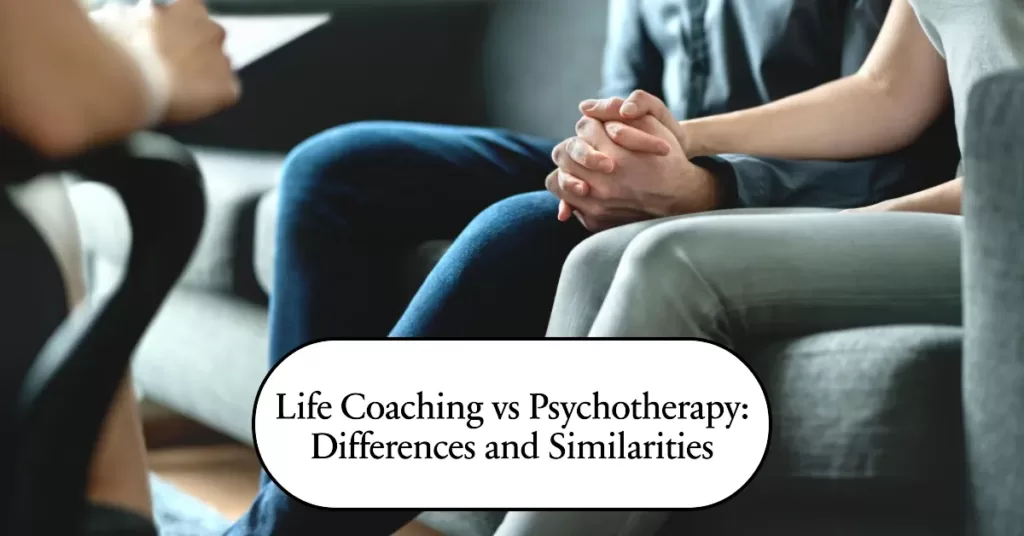Are you feeling stuck in your life or struggling to achieve your goals? Do you feel like you need some support to help you move forward and make positive changes? If so, you may be considering either life coaching or psychotherapy as a way to get the help you need. Both options offer valuable support, but they have different approaches and ways of working with clients.
Today, we will explore the differences and similarities between life coaching and psychotherapy. We’ll explain what each approach involves, how they differ in their focus and methods, and how to choose which one is right for you. By the end of this article, you’ll be able to make an informed decision about which type of support can best help you achieve your personal goals.
So let’s dive in!
Table of Contents
Key Takeaways
- Life coaching is a collaborative process that identifies values, strengths, weaknesses, and goals, while psychotherapy addresses deep-seated emotional problems using talk therapy and evidence-based techniques.
- Both life coaching and psychotherapy require trust and active engagement from the client/patient, and are tailored to individual needs, experiences, and goals using talk therapy as a tool.
- Choosing between life coaching and psychotherapy depends on individual needs and goals, with life coaching focusing on enhancing present life circumstances and psychotherapy on achieving goals in the present moment.
- Life coaching does not require a specific degree or license, while psychotherapy requires at least a master’s degree and state license to practice, making the levels of commitment and investment different.
Definition and Overview of Life Coaching
If you’re looking to make meaningful changes in your life and achieve your goals, life coaching might be just what you need. Life coaching is a collaborative process between you and your coach. It helps you identify your values, strengths, weaknesses, and goals so that you can create a plan for achieving them. The coach provides support, guidance, and accountability throughout the process.
Life coaching is not therapy or counseling. It focuses on the present and future rather than the past. While therapy aims to help people overcome emotional problems and mental health issues by exploring their past experiences, life coaching aims to help people maximize their potential by focusing on their current situation and future aspirations.
In recent years, life coaching has become increasingly popular as people seek ways to improve their lives and achieve personal growth. According to the International Coach Federation (ICF), there were around 71,000 professional coaches worldwide who provide services in various areas such as career development, relationship building, financial management, health and wellness in 2019.
Overall, life coaching is an effective tool for anyone who wants to make positive changes in their lives. Whether you’re feeling stuck or want to reach new heights of success in your personal or professional life – working with a coach can help get you there faster than trying to do it alone!
Definition and Overview of Psychotherapy
Psychotherapy is a form of treatment that helps individuals with mental health issues through talk therapy and other evidence-based techniques. In psychotherapy, the focus is on addressing deep-seated emotional problems and past traumas that affect an individual’s current behavior and thoughts. The therapist aims to create a safe environment for the client to explore their emotions, thoughts, and behaviors without judgment or criticism.
Psychotherapy involves different approaches such as cognitive-behavioral therapy (CBT), psychodynamic therapy, humanistic therapy, and others. CBT focuses on changing negative thought patterns by teaching clients how to identify and challenge them. Psychodynamic therapy looks at how unresolved conflicts from childhood can influence present behavior. Humanistic therapy emphasizes personal growth and self-actualization.
While life coaching also uses talk therapy as a tool for helping individuals achieve their goals, it differs from psychotherapy in several ways. Life coaching focuses on enhancing one’s present life circumstances rather than delving into past traumas or emotional problems. It aims to help individuals discover their strengths, set achievable goals, develop action plans, and overcome obstacles that hinder progress.
Psychotherapy is a form of treatment that addresses deep-seated emotional problems while life coaching focuses on achieving one’s goals in the present moment. Both forms of treatment use talk therapy as a tool but differ in the approach taken toward resolving mental health issues or challenges faced by individuals seeking help. Understanding the differences between these two types of treatments will help you make informed decisions about which approach best suits your needs when seeking professional help.
Differences between Life Coaching and Psychotherapy
While life coaching focuses on achieving personal growth and self-actualization through goal-setting and action plans, psychotherapy delves into emotional problems and past traumas to address deep-seated issues affecting behavior and thoughts. Life coaching is typically viewed as a more proactive approach that helps people identify their strengths, weaknesses, and goals in order to develop strategies for success. On the other hand, psychotherapy is often used to treat mental health conditions such as anxiety disorders, depression, or post-traumatic stress disorder.
One key difference between life coaching and psychotherapy is the level of training required for practitioners. Life coaches are not regulated by any governing body and can receive certification from various organizations with varying standards. Psychotherapists, on the other hand, must have at least a master’s degree in psychology or counseling and be licensed by their state in order to practice.
Another difference between the two approaches is the focus on the past versus the present/future. While psychotherapy may involve exploring traumatic events from one’s past in order to gain insight into current behaviors or patterns of thinking, life coaching tends to focus more on setting concrete goals for the future based on an individual’s strengths and values.
Overall, both life coaching and psychotherapy can be beneficial for individuals looking to improve their lives. The choice between these approaches may depend on an individual’s specific needs or goals – whether they are seeking help with a specific mental health condition or simply looking to make positive changes in their lives. Ultimately, both approaches can provide valuable support along one’s journey toward greater fulfillment and freedom.
Similarities between Life Coaching and Psychotherapy
You might be surprised to learn that both life coaching and psychotherapy share some similarities. First, they both aim to help individuals improve their lives by providing guidance and support. While the focus of life coaching is on achieving specific goals, psychotherapy delves deeper into emotional issues and mental health conditions.
Both approaches also require a level of trust between the client and practitioner. In order for progress to be made, clients need to feel comfortable sharing personal information with their coach or therapist in a safe and non-judgmental space. This trust-building process takes time but is essential for successful outcomes.
Another similarity is that both life coaching and psychotherapy rely on active engagement from the client or patient. The coach or therapist can provide guidance and tools for growth and development, but ultimately it is up to the individual to take action toward their own self-improvement. Without this active participation, progress will be limited.
Lastly, both approaches recognize that each person’s journey toward personal growth is unique. While there may be general principles or techniques used in coaching or therapy, each session should be tailored specifically to the individual’s needs, experiences, and goals.
While there are differences between life coaching and psychotherapy, they share important similarities in their approach to helping individuals achieve personal growth and improved wellbeing through trust-building, active engagement from the client/patient, and personalized sessions (among others).
Choosing the Right Type of Support
When deciding on the type of support that best suits your needs, it’s important to consider factors such as your goals, preferences, and comfort level with the practitioner. Life coaching and psychotherapy are both helpful approaches that can guide you toward a better life. However, they differ in their approach and purpose.
If you’re looking for guidance in achieving specific goals or making changes in your life, then life coaching might be the right choice for you. A life coach works with you to identify your strengths and weaknesses, set achievable goals, create an action plan, and provide accountability. They help you focus on the present and future rather than dwelling on past experiences.
On the other hand, if you’re struggling with mental health issues such as anxiety or depression, then psychotherapy might be more appropriate. A licensed therapist can help you address underlying emotional issues that may have been holding you back from living a fulfilling life. They use evidence-based techniques to help manage symptoms and develop coping strategies.
Ultimately, choosing between life coaching and psychotherapy comes down to understanding what kind of support will best meet your needs. Both approaches have their own unique benefits but require different levels of commitment and investment. It’s important to do some research beforehand so that you can make an informed decision about which path is right for you. Remember: taking control of your own growth is a powerful step toward achieving freedom in all aspects of your life!
P.S. If you want to learn more about both disciplines, I suggest reading about the pros and cons of life coaching vs therapy – it can help you make a more informed choice regarding who you plan to work with as well as discover some insights on combining both approaches simultaneously.




